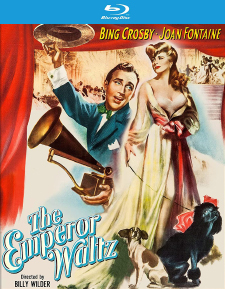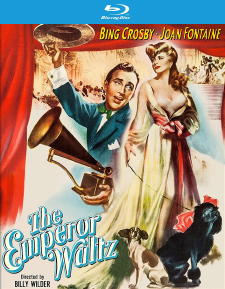Emperor Waltz, The (Blu-ray Review)

Director
Billy WilderRelease Date(s)
1948 (August 17, 2021)Studio(s)
Paramount Pictures (Kino Lorber Studio Classics)- Film/Program Grade: C
- Video Grade: A
- Audio Grade: B+
- Extras Grade: B
Review
Bing Crosby was still at the peak of his film career in 1948 and writers Charles Brackett and Billy Wilder, too, were on a creative roll. Wilder had recently directed The Lost Weekend and Double Indemnity. It was unusual for Brackett and Wilder to write a screenplay for a musical, but they agreed to try their hand at what became The Emperor Waltz.
A period musical set during the early 20th century in the Austria of Emperor Franz Josef, The Emperor Waltz stars Bing Crosby as gramophone salesman Virgil Smith. Virgil is convinced that if he can get an audience with the Emperor, he can persuade him to endorse the new-fangled “orchestra in a box,” sales would skyrocket and so would the salesman’s financial rewards. The Countess Johanna (Joan Fontaine) thinks Virgil uncouth and brash and is icily inhospitable when he turns up at court. But the Countess’ beloved and pampered French poodle Scheherazade and Virgil’s beloved and scruffy fox terrier Buttons take to each other, and the relationship between their owners begins to thaw.
The farcical screenplay allows time for Crosby to croon three songs, the most memorable of them Friendly Mountains, which Virgil sings as he walks among the majestic Alps while echoes serve as chorus and villagers slap-dance in the dells. The staging nicely opens the film to beautiful exteriors that look like a cuckoo clock come to life. In an unexpected, wonderful specialty number, the chauffeur (Bert Pival), in full chauffeur regalia, dances up a storm with a serving girl (Roberta Jonay), their ballet training evident. The sequence comes out of nowhere and is a comic terpsichorean highlight. The film’s love song is The Kiss in Your Eyes, sung by Crosby and heard as a recurring theme for Virgil and the Countess.
Conflict is relegated to whether the Countess’ heart will melt for Virgil, but as in most musicals, it’s just a matter of time, with assorted minor obstacles delaying the inevitable.
Crosby plays his usual everyman screen character, with a few quips that seem left over from his Road pictures. His natural delivery contrasts with the postured, intentionally stiff performances of members of the Hapsburg court. Crosby had a gift for making written dialogue sound casual and spontaneous. Like his character in A Connecticut Yankee in King Arthur’s Court, he is placed in a historical setting that differs markedly from those of his typical 1940s screen appearances. Out of his element in a Viennese operetta milieu, he tends to overemphasize many of his lines when a more subtle delivery would have been more appropriate.
Fontaine looks lovely and is costumed splendidly by Edith Head. She’s fine as the aloof Countess but never completely convinces as a woman who has fallen in love with Virgil. Though she’s the co-star, she often plays second fiddle to a couple of charming, photogenic dogs who have a lot more to do than look like a mannequin in a department store window.
There are effective supporting performances by Roland Culver as the Countess’ father, Harold Vermilyea as the Chamberlain, and Lucille Watson as gossipy Princess Bitotska.
The screenplay is mildly entertaining but coasts on Crosby’s star power most of the time. Not one of the team’s best efforts, The Emperor Waltz is an awkward fit for Brackett and Wilder. There’s a very well-written scene between Virgil and the Emperor (Richard Haydn) when Virgil pleads for the hand of the Countess and the Emperor logically and thoughtfully enumerates the pitfalls of such a marriage. In a character that could easily have been a caricature, the Emperor appears as an intelligent ruler whose age and long reign have fostered wisdom and the ability to see events and foresee their consequences. This scene is markedly different from most of the picture, which is in a far lighter vein. Aside from that, the dialogue generally lacks sparkle and often sounds flat. There aren’t any big laughs, adding to the film’s overall mediocrity.
As director, Billy Wilder seems to have been lost as to how to make his own screenplay come to life. His staging is routine, with uninteresting camera work, and scenes that lack the sense of fun, which is essential to farce. Crosby tries but is too tied to his screen persona than the requirements of the role. Sig Rumann as the royal veterinarian, Dr. Zwieback, has the right attitude and he plays his part broadly and comically. The Emperor Waltz is not a Marx Brothers picture, but it sorely needs a shot of fancy.
Featuring 1080p resolution, the US Blu-ray debut of The Emperor Waltz from Kino Lorber Studio Classics is presented in the aspect ratio of 1.37:1. The Technicolor photography definitely enhances the film’s thin plot. Mixing elaborate studio sets with picturesque alpine exteriors, the film looks great. The color palette is varied, with reds especially prominent in a cardinal’s habit, uniform tunics, villagers’ costumes, and Fontaine’s bright lipstick. The Countess’ hunting outfit and the ostrich plumes on her father’s helmet are a deep forest green. Edith Head’s flowing dresses for Fontaine include soft pink, pale yellow, and a white formal outfit with matching hat and parasol. Her blonde wig is a wonder of the hair dressing department, with its upswept pompadour and what looks like yards of hair twirled into a remarkable sculpture. Actual exteriors are blended with studio process shots, a common technique at the time but apparent to modern viewers. Art direction by Hans Dreier and Franz Bachelin is opulent, with an enormous ballroom set dominating key scenes at the palace.
The soundtrack is English 2.0 Mono DTS-High Definition Master Audio. English SDH subtitles are an available option. Dialogue is crisp and clear throughout. The songs are recorded with great fidelity and sound rich. The string introduction to The Kiss in Your Eyes by the village’s fiddle makers sets a romantic mood for Crosby’s vocal. Friendly Mountains is the most interesting from a sound point of view since it plays with echoes and villagers responding to Virgil’s enthusiastic full-throated singing. When a vintage automobile appears, assorted sputtering noises are heard. The ballroom sequences that open and close the film feature a full orchestra and nicely bookend the film with period-suitable music. Though the setting screams “operetta,” the songs are contemporary by 1940s standards.
Bonus materials include an audio commentary and several theatrical trailers.
Audio Commentary – Film historian Joseph McBride, author of Billy Wilder: Dancing on the Edge, presents the commentary. Wilder is described as an “acerbic, witty, moving, great filmmaker” who made many different types of films. He wrote several screenplays in Germany and came to the United States just after the Nazis came to power. The Emperor Waltz takes place in 1901, a few years before Wilder was born in what was then the Austrian Empire, the same as depicted in the film. Wilder is not generally associated with musicals, so The Emperor Waltz is an odd entry in his filmography. Many critics feel the film is a failed attempt to duplicate the style of Ernst Lubitsch. A Foreign Affair, released the same year, is Wilder’s romantic comedy set in the rubble of post-World War II Berlin. The Emperor Waltz is haunted by phantoms of the past. The Austrian Empire collapsed after World War I. Color in The Emperor Waltz is rich and lavish, but the film is not particularly funny. Virgil’s dog was cast to resemble Nipper, the RCA Victor trademark canine, for a sight gag that audiences would have recognized. The title is based on a Strauss waltz. The film, which opened at the Radio City Music Hall, did well at the box office. Crosby was a popular movie star and recording artist and had his own weekly radio program. Wilder’s European background is discussed. He lost his mother and grandmother in the Holocaust and later worked on the film Death Mills, a record of the German concentration camp atrocities. Wilder wanted to do a musical because, after working on Death Mills, he was in a terrible state of mind. Wilder didn’t blame Bing Crosby for The Emperor Waltz being disappointing. He was a fan of Crosby and loved jazz, particularly Paul Whiteman’s orchestra, which Crosby later joined as a member of The Rhythm Boys. In the film, Crosby makes quips and wisecracks that aren’t funny. Co-writer Brackett didn’t quite understand what the film was about and called it a “stinker” and “quite boring.” The censors objected to the dogs mating as a representation of the growing attraction between the Countess and Virgil. Wilder had to express sexual overtones through witty dialogue and clever situations in earlier films, but he became more open and explicit in later pictures, such as Avanti and Fedora. Wilder and his usual writing partner, I.A.L. Diamond, didn’t know how to deal with changing audiences. For The Emperor Waltz, Wilder wanted “confectionary color” and was unhappy with the color of certain objects, ordering them painted and adding to the film’s budget. Later on, Wilder said the film looked like an ice cream shop. Wilder used The Emperor Waltz to subliminally comment on the Holocaust, but the associations were never made by audiences. At the end of the film, everyone gets what he or she wants. The fantasy of old Vienna comes back into view with the song Love Is a Dream to the tune of The Emperor Waltz. When Sam Goldwyn saw Wilder looking downcast, he asked the director what was wrong. Wilder said he was depressed about how The Emperor Waltz turned out. Goldwyn ironically advised that “you have to take the bitter with the sour.” Wilder found the advice wise and took it to heart.
Theatrical Trailers – Ten trailers for other Blu-ray releases available from Kino Lorber Studio Classics are included: Road to Morocco, Kiss the Blood Off My Hands, The Lost Weekend, Five Graves to Cairo, A Foreign Affair, Witness for the Prosecution, Irma La Douce, One, Two, Three, The Fortune Cookie, and Thoroughly Modern Millie.
The Emperor Waltz never achieves the heights of the best musicals. Crosby does his best with the weak material and his star power drives the picture. Fontaine isn’t much help as her wooden performance never convinces us that the Countess has fallen in love with the foreign commoner. Art direction, costuming, songs, and Technicolor help, but the film can’t overcome a dreary screenplay.
- Dennis Seuling

